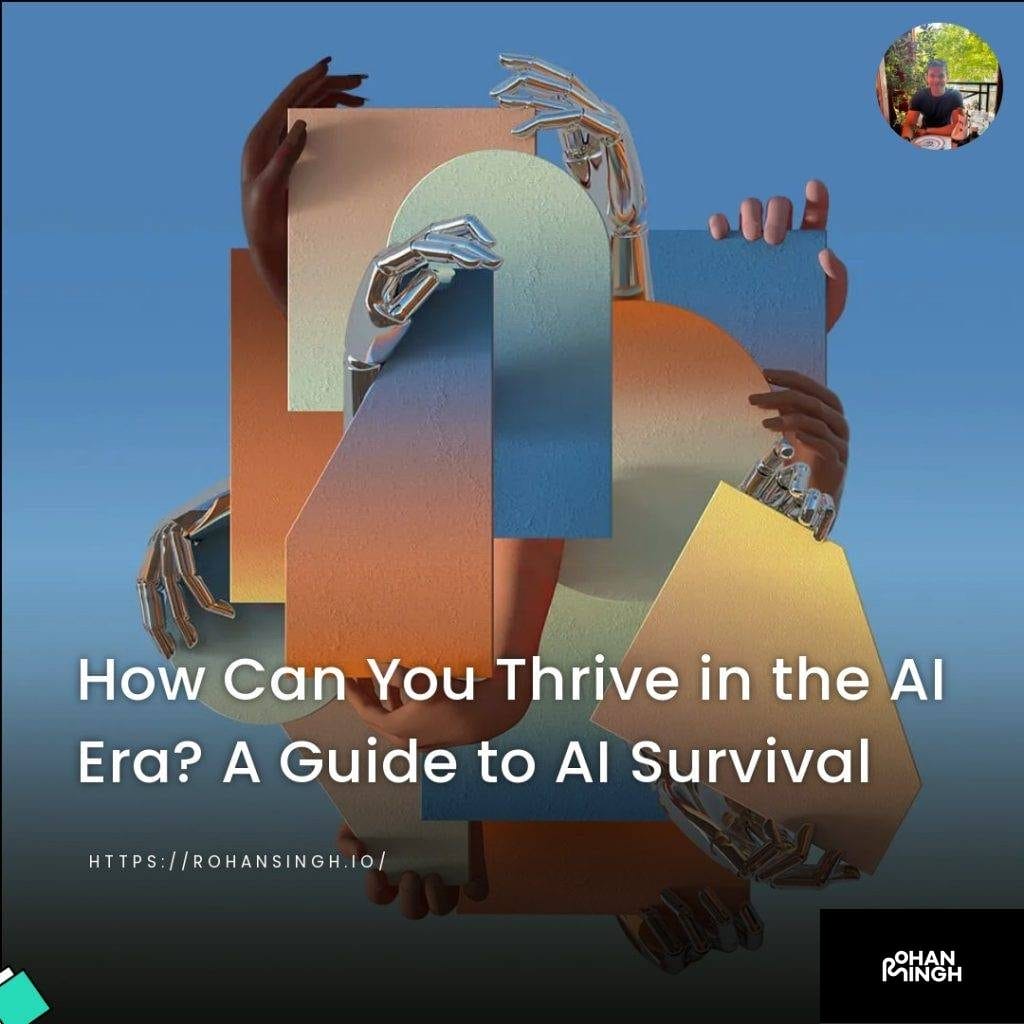How Can You Thrive in the AI Era? A Guide to AI Survival

What is Artificial Intelligence?
Artificial Intelligence (AI) is a branch of computer science that focuses on creating intelligent machines capable of mimicking human intelligence. It is a powerful tool that has the incredible potential to transform various aspects of our lives. AI encompasses machine learning, deep learning, and neural networks, enabling computers to learn from vast amounts of data and perform complex tasks that were once limited to human capabilities. From autonomous vehicles to language models, AI is reshaping industries and revolutionizing business models. While AI offers endless possibilities, it is crucial for individuals to adapt and acquire the necessary skills to survive in this era of artificial intelligence.
Table of Contents
ToggleChallenges of the AI Era
The AI era brings with it a multitude of challenges that we must navigate as we move forward. While the potential for technological advancements in artificial intelligence is promising, there are also risks and unintended consequences that need to be addressed.
One of the primary challenges is the disruption of traditional industries and job markets. As AI continues to advance and automate various tasks, there is a growing need for upskilling and future-proofing skills. Many jobs that were once performed by humans may now be taken over by machines, requiring individuals to acquire new skill sets to remain relevant in the job market.
Moreover, ethical considerations are crucial in the AI era. The power of AI brings both tremendous opportunities and potential dangers. Issues such as privacy, security, and bias need to be carefully examined and regulated to ensure that AI is used responsibly and in the best interest of humanity.
As we embrace the AI era, it is imperative for individuals and organizations to be proactive in adapting to the changes it brings. This includes investing in education and training to develop the necessary skills to work alongside AI and harness its potential.
The AI era presents us with unique challenges that require thoughtful consideration. By staying informed, upskilling, and addressing ethical concerns, we can embrace the benefits of AI while mitigating its potential risks and unintended consequences, ensuring a successful transition into the future.
Let's talk about your future project!
Eager to collaborate on your upcoming endeavor? Let's explore and ignite the potential of your next big idea, shaping a promising future together!
Human Intelligence and Machine Learning
In the era of artificial intelligence (AI), the convergence of human intelligence and machine learning has become increasingly essential. As AI technologies continue to advance, their impact on industries and job markets is undeniable. It is crucial for individuals and organizations to understand the intersection between human intelligence and machine learning, as well as how to navigate and survive in this rapidly evolving landscape.
Human Intelligence and Machine Learning:
Human intelligence, with its soft skills and creative approaches, complements the powerful tools and capabilities of machine learning. While machines excel at repetitive tasks and analyzing vast amounts of data, human intelligence brings the human touch and critical thinking required for complex tasks. Machine learning, on the other hand, empowers human intelligence by automating routine tasks and providing actionable insights from massive amounts of data.
To survive in the AI era, professionals need to embrace the partnership between human intelligence and machine learning. By developing a deep understanding of AI tools and applications, individuals can leverage their human capabilities with AI technologies to enhance their professional life. This includes upskilling in areas such as data analysis, programming, and understanding neural networks.
Business leaders also need to adapt their business models to incorporate AI technologies. By combining the power of human experience and AI-powered systems, organizations can unlock incredible potential in areas such as customer experiences, business strategy, and industry leadership.
Surviving in the AI era requires recognizing the importance of both human intelligence and machine learning. By harnessing the strengths of both, individuals and organizations can navigate the complexities of the artificial intelligence landscape and unlock the true potential of this transformative technology.

The Power of Human Touch
In the fast-paced era of artificial intelligence (AI), it’s easy to overlook the power of the human touch. However, in a world where technology is constantly advancing, the importance of human interaction and emotional intelligence cannot be overstated.
While AI excels at analyzing vast amounts of data and automating routine tasks, it lacks the ability to truly understand and connect with people on an emotional level. This is where the human touch comes in. Our emotional intelligence allows us to empathize, understand, and build meaningful relationships.
In a digital world, where interactions are often impersonal, businesses that prioritize human interaction can truly stand out. Personalized experiences that cater to individual needs and preferences create a sense of connection and trust. Customers and clients are more likely to remain loyal when they feel understood and valued.
To survive in the AI era, businesses and professionals must leverage technology to enhance, rather than replace, human touch. Tools and applications, such as AI-powered customer relationship management systems and data analytics platforms, can provide valuable insights to personalize experiences. However, the key is to use these tools to augment human capabilities, rather than diminish them.
In the AI survival landscape, the human touch remains a powerful differentiator that builds trust, loyalty, and ultimately, long-term success. So, embrace the potential of AI, but never underestimate the power of human connection.
Deep Learning and Business Leaders
Deep learning plays a crucial role in helping business leaders navigate the AI era. With the exponential growth of data, deep learning algorithms have become essential tools for extracting valuable insights and making data-driven decisions.
In the AI era, the ability to analyze and understand vast amounts of data is a game-changer. Deep learning algorithms, modeled after the human brain’s neural networks, can process and learn from massive datasets, recognizing patterns and generating actionable insights. This empowers business leaders to uncover hidden opportunities, identify market trends, and make informed decisions.
By leveraging deep learning, business leaders can improve their decision-making capabilities in several ways. Firstly, deep learning algorithms can decipher complex patterns and correlations within the data, revealing valuable insights that may not be easily discernible to humans. Additionally, these algorithms can handle massive amounts of data quickly and efficiently, enabling real-time analysis and faster decision-making.
Furthermore, deep learning can enhance business processes and drive innovation. By automating repetitive and time-consuming tasks, business leaders can free up valuable resources and focus on more strategic functions. Deep learning can also fuel innovation by providing creative approaches to problem-solving and enabling the development of new business models.
Deep learning is a powerful tool for business leaders in the AI era. It enables them to harness the potential of data, make data-driven decisions, streamline processes, and drive innovation. By embracing deep learning, business leaders can effectively thrive in the AI era and stay ahead of the competition.
A Powerful Tool for Corporate Leaders
In the AI era, artificial intelligence (AI) has emerged as a powerful tool for corporate leaders, revolutionizing the way businesses operate. With its incredible potential, AI empowers corporate leaders to make informed decisions, optimize operations, and drive innovation.
When it comes to decision-making, AI offers a significant advantage. AI algorithms can analyze vast amounts of data and extract actionable insights in real-time. This enables corporate leaders to quickly identify market trends, uncover hidden opportunities, and make data-driven decisions. According to a study by PwC, 72% of business leaders believe AI will be a “business advantage” in decision-making.
Additionally, AI enhances operations optimization by automating repetitive tasks and streamlining processes. For example, AI-powered chatbots can handle customer queries more efficiently, freeing up valuable resources and improving customer experiences. In fact, a recent survey by Gartner found that 85% of customer interactions will be managed by AI by 2021.
Furthermore, AI fosters innovation by providing creative approaches to problem-solving and enabling the development of new business models. For instance, companies like Uber and Lyft leverage AI algorithms to optimize route planning and maximize efficiency. Moreover, AI-driven predictive analysis helps companies in demand forecasting, leading to better inventory management and cost reductions.
AI is a powerful tool for corporate leaders in the AI era. Its ability to enhance decision-making, optimize operations, and drive innovation is invaluable. By adopting AI technologies, corporate leaders can stay ahead of the competition and thrive in the ever-changing business landscape.

Industry Leaders Surviving in the AI Era
Industry leaders are well aware of the immense potential of artificial intelligence (AI) and the impact it can have on their organizations. In order to survive and thrive in the AI era, industry leaders need to adapt and leverage AI technologies effectively. With the ability to analyze vast amounts of data and extract actionable insights in real-time, AI offers a powerful tool for decision-making. By leveraging AI algorithms and tools, industry leaders can quickly identify market trends, uncover hidden opportunities, and make data-driven decisions. AI also enhances operations optimization by automating repetitive tasks and streamlining processes, allowing industry leaders to allocate resources more efficiently. Additionally, AI fosters innovation by providing creative approaches to problem-solving and enabling the development of new business models. Overall, industry leaders who embrace AI and incorporate it into their strategies will be better positioned to navigate the rapidly changing business landscape and stay ahead of the competition.
Enhancing Soft Skills and Human Capabilities
In the era of artificial intelligence (AI), enhancing soft skills and human capabilities is crucial for individual success and survival. While AI and machine learning are powerful tools that can automate tasks and process vast amounts of data, they lack the human touch and creative approaches that can truly unlock their incredible potential.
Soft skills, such as empathy, communication, problem-solving, and critical thinking, complement and amplify the capabilities of AI. These skills allow individuals to understand and connect with customers on a deeper level, providing a human experience that AI alone cannot replicate. Additionally, soft skills enable professionals to navigate complexity, adapt to change, and collaborate effectively in diverse teams – all qualities that are highly valuable in the AI era.
To thrive in this new era, individuals should develop specific soft skills. Firstly, emotional intelligence is vital in understanding and responding to the needs, emotions, and reactions of others, creating more engaging customer experiences. Secondly, creativity and innovation are crucial for finding new solutions and approaches that AI may not yet be able to envision. Lastly, continuous learning and adaptability are essential as the AI landscape rapidly evolves, enabling individuals to stay ahead of technological advancements and harness the full potential of AI.
Enhancing soft skills and human capabilities is paramount in the AI era. These skills not only complement and amplify the capabilities of AI but also enable individuals to navigate complex tasks, drive creative approaches, and provide exceptional customer experiences. By developing emotional intelligence, creativity, and a thirst for continuous learning, individuals can future-proof their skills and thrive amidst the rapidly advancing AI landscape.
Harnessing the True Potential of AI
Harnessing the true potential of AI is crucial in today’s rapidly evolving technological landscape. This powerful tool has the ability to revolutionize industries across the board, from healthcare to finance to manufacturing. AI has the capability to improve efficiency, increase productivity, and enhance decision-making processes.
In the healthcare sector, AI applications have been successful in diagnosing diseases, creating personalized treatment plans, and monitoring patient progress. For example, AI-powered ultrasound machines have proven to be highly effective in providing accurate diagnoses and reducing medical errors.
In finance, AI is utilized to analyze vast amounts of data and detect patterns to inform investment decisions, predict market trends, and manage risks. AI algorithms can analyze market conditions in real time, providing actionable insights to financial institutions.
In manufacturing, AI-driven automation is revolutionizing production processes. With the use of machine learning algorithms and neural networks, manufacturers can optimize operations, improve quality control, and predict maintenance needs. This results in increased productivity, reduced costs, and improved overall efficiency.
To fully harness the true potential of AI, industries must embrace the adoption of machine learning and incorporate it into their business strategies. By leveraging this technology, businesses can stay ahead of the competition, enhance their customer experiences, and drive innovation. AI survival in today’s world is not just a necessity but a strategic advantage.

Taking on Complex Tasks with AI
In the rapidly evolving AI era, artificial intelligence serves as a powerful tool for taking on complex tasks. With the aid of advanced technologies such as neural networks and deep learning algorithms, AI systems can analyze massive amounts of data and process it with unprecedented accuracy and speed.
Industries across the board are already harnessing the potential of AI to tackle intricate tasks. In healthcare, AI algorithms are being used to diagnose diseases, create personalized treatment plans, and monitor patient progress. These systems can analyze medical images, genetic data, and patient histories to provide accurate diagnoses and recommend optimal treatment options.
Finance is another sector where AI is making significant strides. AI-powered algorithms are able to analyze vast amounts of market data and detect patterns, helping financial institutions make informed investment decisions, predict market trends, and manage risks.
The concept of autonomous vehicles further exemplifies AI’s ability to handle complex tasks. Self-driving cars, enabled by AI technologies, can navigate and make decisions in real-time, taking into account variables such as traffic conditions and pedestrian movement. This technology has the potential to revolutionize transportation, making it safer and more efficient.
Artificial intelligence, empowered by neural networks and deep learning algorithms, possesses incredible potential to take on complex tasks across various industries. As businesses and organizations continue to adopt AI technologies, they can tap into its vast capabilities to drive innovation, enhance efficiency, and achieve remarkable results. AI Survival in this era means embracing and leveraging the power of AI for solving intricate problems.
Utilizing AI to Transform Business Models
In the rapidly advancing era of artificial intelligence, businesses are recognizing the transformative power of incorporating AI-driven business models. By leveraging machine learning algorithms and advanced data analytics, organizations can not only optimize their operations but also completely revolutionize their decision-making processes and drive innovation.
One key aspect of utilizing AI in business models is harnessing the power of machine learning algorithms. These algorithms can analyze vast amounts of data, identifying patterns and delivering actionable insights that were previously unimaginable. By leveraging this technology, businesses can make data-driven decisions with unprecedented accuracy and efficiency, leading to improved outcomes and competitive advantages.
Furthermore, data analytics plays a crucial role in transforming business models. With AI-powered analytics tools and applications, businesses can extract valuable insights from complex data sets, enabling them to personalize customer experiences and identify new revenue streams. By understanding customer preferences and behaviors in depth, organizations can tailor their offerings to meet individual needs, resulting in stronger customer relationships and increased customer loyalty.
Incorporating AI in business models also enables organizations to drive innovation. By leveraging AI technologies, businesses can explore new ways of operating, develop creative approaches to problem-solving, and even create entirely new products and services. AI opens up a world of possibilities, allowing businesses to tap into their true potential and stay ahead of the competition.
By adopting AI-driven business models, organizations can leverage machine learning algorithms and advanced data analytics to transform decision-making processes, optimize operations, personalize customer experiences, and drive innovation. AI is no longer just a buzzword – it is a powerful tool that has the potential to reshape entire industries. Embracing AI survival is essential for businesses to thrive in the artificial intelligence era.
Leveraging Language Model for Creative Approaches
Leveraging language models is a powerful tool for incorporating creative approaches in the AI era. These models, trained on vast amounts of text data, can generate innovative ideas and content, providing businesses with a competitive edge.
Language models, such as OpenAI’s GPT-3, have the ability to understand and mimic human language, enabling them to generate coherent and contextually relevant text. By inputting prompts or questions, businesses can tap into the creative potential of these models and receive unique and inventive responses.
The benefits of using language models for generating innovative ideas and content are manifold. Firstly, they can assist in brainstorming sessions by providing fresh perspectives and novel insights. This can spark creativity and lead to breakthrough ideas that may have otherwise been overlooked.
Secondly, language models can generate content for various purposes, such as marketing campaigns, blog posts, or social media updates. By leveraging AI to create engaging and persuasive content, businesses can enhance their online presence, attract new customers, and drive conversion rates.
Additionally, language models can assist in developing creative approaches to problem-solving. By exploring different scenarios and generating potential solutions, businesses can uncover unique strategies to address challenges and stay ahead of the competition.
In the AI era, harnessing the capabilities of language models is essential for businesses looking to thrive. By incorporating these models into their processes, organizations can unlock a world of creative possibilities, drive innovation, and ensure long-term success. So, embrace the power of language models and unleash your creative potential in the AI era.

Customer Experiences in the AI Era
In the rapidly evolving era of artificial intelligence (AI), businesses need to adapt and leverage this powerful tool to survive and thrive. AI has the potential to transform customer experiences by providing personalized and seamless interactions at every touchpoint. By harnessing AI technologies, businesses can gain valuable insights, enhance customer satisfaction, and ultimately drive growth. In this article, we will explore how businesses can leverage AI to create exceptional customer experiences and stay ahead in the AI survival race.
1. Personalization at Scale:
AI enables businesses to analyze vast amounts of data to gain valuable customer insights. By utilizing machine learning algorithms and neural networks, businesses can understand customer preferences, behaviors, and patterns. This knowledge allows them to deliver tailored and personalized experiences at scale. Through AI-powered recommendation systems, chatbots, and virtual assistants, businesses can provide real-time assistance, anticipate customer needs, and enhance overall satisfaction.
2. Omnichannel Engagement:
With the rise of mobile devices and online forums, customers now expect seamless experiences across multiple channels. AI can help businesses provide consistent and cohesive experiences by integrating data from various touchpoints. AI-powered tools and applications can track customer interactions, analyze sentiment, and deliver unified experiences across websites, mobile apps, social media platforms, and in-store interactions. This ensures a seamless and personalized journey regardless of the channel used.
3. Enhanced Customer Support:
AI-powered chatbots and virtual assistants are revolutionizing customer support. These intelligent systems can handle routine inquiries and assist customers in real-time, 24/7. By leveraging natural language processing and deep learning, chatbots can provide accurate and efficient responses, reducing wait times and improving customer satisfaction. Furthermore, AI can analyze customer feedback, sentiment, and behavior to identify pain points and proactively address issues, creating a positive and memorable customer support experience.
4. Predictive Analytics:
AI’s predictive capabilities enable businesses to anticipate customer needs and offer proactive solutions. By analyzing historical data and patterns, AI algorithms can accurately forecast customer preferences, buying behavior, and future actions. This allows businesses to anticipate demand, personalize offers, and deliver targeted marketing campaigns to maximize engagement and conversion rates.
In the AI era, businesses must prioritize customer experiences to stay competitive. By embracing AI technologies and leveraging its capabilities, businesses can provide personalized, seamless, and proactive experiences that meet and exceed customer expectations. The survival of businesses in this AI-powered landscape depends on their ability to adapt, innovate, and deliver exceptional customer experiences.
Utilizing AI to Enhance the Human Experience
In the ever-evolving era of artificial intelligence (AI), businesses and individuals alike can leverage this powerful tool to enhance the human experience by providing personalized and tailored solutions. AI’s ability to analyze vast amounts of data and provide actionable insights uniquely positions it to improve decision-making and optimize various aspects of our daily lives.
By harnessing AI technologies, businesses can deliver highly personalized and tailored solutions to their customers. Through machine learning algorithms and neural networks, AI can analyze a multitude of data points, such as customer preferences, behaviors, and patterns. This allows businesses to gain valuable insights that enable them to create customized experiences and meet individual needs. From recommendation systems that suggest products or services based on individual preferences to virtual assistants that provide personalized assistance, AI enhances convenience and personalization, ultimately elevating the overall customer experience.
In addition to enhancing customer experiences, AI’s analytical capabilities empower leaders and individuals to make better decisions. As AI algorithms analyze large volumes of data, they can provide actionable insights that aid in strategic decision-making. From industries like finance and healthcare to marketing and sales, AI’s ability to analyze complex data sets empowers decision-makers to identify trends, anticipate market demands, and make data-driven decisions that optimize outcomes.
Moreover, AI-powered technologies, such as autonomous vehicles and virtual assistants, demonstrate how AI can seamlessly integrate into our daily lives. Autonomous vehicles not only improve convenience and efficiency in transportation but also enhance safety by leveraging AI to analyze real-time data and make split-second decisions. Virtual assistants, on the other hand, provide personalized recommendations, schedules, and reminders that cater to individual needs, enhancing productivity and enabling individuals to focus on higher-value tasks.
Artificial intelligence is a powerful tool that can be utilized to enhance the human experience. By leveraging AI to personalize solutions, analyze vast amounts of data, and provide actionable insights, businesses and individuals can unlock AI’s incredible potential to create tailored experiences and make data-driven decisions, ultimately elevating our quality of life. So, embrace AI and survive in the AI era!
Professional Life in an AI-Driven World
In today’s AI-driven world, professionals must navigate and succeed amidst the rapid advancements in artificial intelligence. To thrive in this ever-evolving landscape, it is crucial to embrace practical tips and strategies that ensure success.
First and foremost, professionals should understand the transformative impact of AI across various industries. From healthcare to finance, AI is revolutionizing job roles and skill requirements. For example, AI-powered tools like AI-powered ultrasound machines are enabling medical professionals to diagnose patients more accurately and efficiently, saving valuable time and resources.
To thrive in this AI era, professionals must develop key skills and competencies. Continuous learning and adaptability are essential traits for staying relevant. As AI technology evolves, so do job demands. By investing in upskilling and reskilling, professionals can broaden their expertise and remain competitive.
Incorporating AI technologies into their work is another crucial step. Tools and applications such as language models and deep learning algorithms are becoming increasingly accessible, providing professionals with powerful tools for problem-solving and decision-making. By leveraging these AI tools, professionals can streamline processes, optimize efficiency, and gain a competitive edge in their respective fields.
Professionals can successfully navigate and thrive in an AI-driven world by embracing practical tips and strategies. Continuous learning, adaptability, and incorporating AI technologies into their work are the keys to professional success in this ever-evolving landscape.

Conclusion
In conclusion, surviving in the artificial intelligence era requires professionals to embrace the transformative power of AI and adapt to the changing landscape. The challenges posed by AI should not be feared, but rather seen as an opportunity to enhance our human capabilities and bring the human touch to technological advancements. By continuously learning and being adaptable, professionals can stay competitive and future-proof their careers.
Business leaders have a pivotal role in driving the adoption of AI technologies and transforming business models. The incredible potential of AI as a powerful tool cannot be overlooked. From language models to deep learning algorithms, these AI tools provide professionals with creative approaches to solving complex tasks and making data-driven decisions.
However, as we navigate the AI era, it is crucial to consider the unintended consequences and ethical implications that may arise. Striking the right balance between AI-enabled automation and the preservation of the human experience is essential for long-term success.
In this rapidly evolving AI landscape, it is imperative for professionals to keep up with the latest advancements, acquire AI-proof skills, and embrace a mindset of continuous learning. By doing so, individuals can harness the true potential of AI to drive innovation, deliver exceptional customer experiences, and thrive in the AI era.
Take the leap into the AI era, equip yourself with the necessary skills and knowledge, and embrace the incredible opportunities that lie ahead. The future belongs to those who embrace AI and are willing to explore its limitless possibilities. So, join the AI revolution, take charge of your professional life, and unlock a future filled with vast amounts of opportunities. Don’t let the AI era pass you by. Adapt, grow, and thrive in the age of artificial intelligence.
FAQs
What are the potential consequences of unintended AI advancements?
Unintended consequences of AI advancements can vary from ethical dilemmas to socioeconomic impacts. As AI becomes more prevalent in society, concerns about data privacy, job displacement, and bias in decision-making arise. It is crucial for individuals and organizations to actively engage in ethical discussions and implement safeguards to mitigate these risks.
How can business leaders future-proof their skills in the AI era?
To future-proof their skills in the AI era, business leaders should embrace a mindset of continuous learning and invest in AI training programs. They should stay updated with the latest technological advancements, such as machine learning and deep learning, and understand how AI can drive innovation in their industries. Additionally, developing soft skills such as critical thinking, creativity, and emotional intelligence will be invaluable in complementing AI technologies.
What are some AI-proof skills for professionals?
AI-proof skills encompass those that are less likely to be automated by AI technologies. These include complex problem-solving, strategic thinking, adaptability, and creativity. Professionals should focus on cultivating skills that leverage the unique capabilities of human intelligence, such as empathy, intuition, and holistic decision-making. By combining these skills with AI technologies, individuals can create a competitive advantage in the AI era.
How can businesses integrate AI technologies in their strategies?
Integrating AI technologies in business strategies requires identifying specific use cases and understanding how AI can enhance existing processes. Businesses can leverage AI-powered tools and applications like chatbots for customer support, predictive analytics for data-driven decision-making, and autonomous vehicles for logistics optimization. By aligning AI with their goals and consistently evaluating its impact, businesses can optimize operations and deliver enhanced customer experiences.
Similar articles about Acquisition Strategy:
Ready to Plan Your Dream Trip with ChatGPT Vacation Planner?, Want to Experience the Magic of Third-Party ChatGPT Plugins?, How can Efficient Project Management Boost Your Success?, Looking to Boost Your YouTube Views? Use ChatGPT for Top-Notch Video Optimization!
Are You Leveraging SEO Audits to Win More Clients?, Ever Thought of Starting an AI Career? Discover How Today!, Can SEO Propel Your Store to 1 Million Monthly Visitors?, How Can Google Bard Supercharge Your SEO Content Strategy?
Eager to Multiply Local Business Reviews from Travelers?, Which is the Best AI Chatbot? A Head-to-Head Comparison of ChatGPT, Claude 2, Bing Chat, and Google Bard, Want a Game-Changer in SEO? Have You Tried AI and Chrome Extensions Yet?,
Can AI-Powered Growth Spark Your Business Acceleration and Digital Transformation?, Ready to Achieve SEO Mastery and Stand Out in the Digital World?, Ready to Dominate the Future? How Can You Kickstart Your AI Data Science Career Today?, Want to Dominate Google SERP? Learn How to Supercharge Your Content Strategy!, Have You Explored the ChatGPT Android App Yet?
Ready to Supercharge Your Business? Harness the Power of Always-On PPC Strategy Now!, Are You Choosing the Right Digital Agency for Your Business? Discover the 5 Key Considerations!, How Can AI Marketing Tools Transform Your Social Media Career?, How Can You Dominate YouTube Rankings with SEO in 2023?
Struggling with Competitive Organic Keywords? Try Our Advanced Keyword Domination Strategy!, Want to Dominate Google Page Ranking? Discover the Secrets Here!, Can You Transform Unexpected Publicity into Opportunity with PPC?, Want to Create High-Converting Emails Fast? Have You Tried AI Copywriting & ChatGPT?
How Can You Thrive in the AI Era? A Guide to AI Survival, Want to Dominate Google's First Page? Discover the Essential SEO Ranking Factors, How to Implement Generative AI Tools Safely and Ethically? Navigating the Ethical AI Implementation Quandary, Ready to Scale Your Career? How to Learn Growth Marketing in 6 Transformative Steps
Ready to Launch Your Career? How to Land Your First Digital Marketing Job: A Must-Read Guide for Freshers!, Want to Safeguard Your Paid Search Campaigns? Discover Proven Strategies Here!, Looking to Boost Your WordPress SEO with AI? Here are 12 Tools You Can’t Miss!, Want to Boost Your Google Rankings? Master SEO Strategies to Hit #1 Now!
How Can AI SEO Revolutionize Your Online Strategy?, Are Your High Schoolers Ready for the AI Wave?
What Marketing Strategy Did Cheetos Employ for Plants vs. Zombies Collaboration?
Rohan Singh | May 1, 2024 | Acquisition What Marketing Strategy Did Cheetos Employ for Plants vs. Zombies Collaboration? Background on Cheetos Cheetos, a popular brand of cheese-flavored snacks, has made a name for itself with its bold and playful marketing strategies. Known for its irreverent and creative campaigns, Cheetos has consistently found unique ways […]
What Marketing Strategy Did Cheetos Employ for Plants vs. Zombies Collaboration?
Rohan Singh | May 1, 2024 | Acquisition What Marketing Strategy Did Cheetos Employ for Plants vs. Zombies Collaboration? Background on Cheetos Cheetos, a popular brand of cheese-flavored snacks, has made a name for itself with its bold and playful marketing strategies. Known for its irreverent and creative campaigns, Cheetos has consistently found unique ways […]
What Differentiates Differentiated Marketing Strategy from Undifferentiated?
Rohan Singh | April 30, 2024 | Acquisition What Differentiates Differentiated Marketing Strategy from Undifferentiated? Definition of Differentiated Marketing Strategy A differentiated marketing strategy is a targeted approach that focuses on creating unique products or services to meet the specific needs and preferences of different customer segments. It recognizes that customers have diverse tastes, preferences, […]
What Sets Apart the Marketing Concept from a Marketing Strategy?
Rohan Singh | April 29, 2024 | Acquisition What Sets Apart the Marketing Concept from a Marketing Strategy? Definition of Marketing Concept The marketing concept is a philosophy that places the customer at the center of all marketing activities. It focuses on understanding the needs and wants of the target market and delivering value to […]
Which promotional mix strategy targets market channel members?
Rohan Singh | April 28, 2024 | Acquisition Which promotional mix strategy targets market channel members? When it comes to promoting a product or service, companies utilize various strategies to reach their target audiences. One key strategy that directs marketing efforts toward market channel members is known as trade promotion. Trade promotion is a type […]
Should charter schools adopt regional or national marketing strategies?
Rohan Singh | April 27, 2024 | Acquisition Should charter schools adopt regional or national marketing strategies? Purpose When it comes to marketing strategy in the field of charter schools, two broad approaches can be taken: regional and national. Each approach has its purpose and benefits depending on the goals and aspirations of the charter […]
Topics :
Share :






